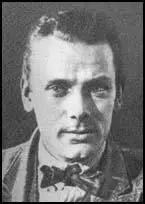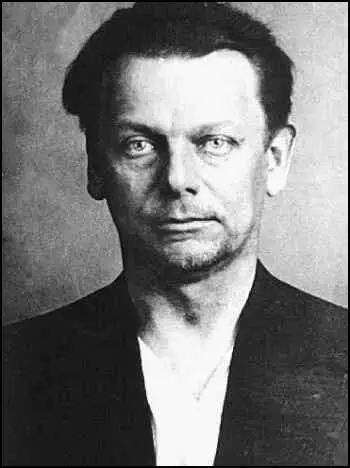Hugo Eberlein

Hugo Eberlein was born in 1887. As a young man he joined the Social Democratic Party (SDP). Eberlein was a leading figure in the anti-militarist section of the SDP.
Karl Liebknecht was the only member of the Reichstag who voted against Germany's participation in the First World War. He argued: "This war, which none of the peoples involved desired, was not started for the benefit of the German or of any other people. It is an Imperialist war, a war for capitalist domination of the world markets and for the political domination of the important countries in the interest of industrial and financial capitalism. Arising out of the armament race, it is a preventative war provoked by the German and Austrian war parties in the obscurity of semi-absolutism and of secret diplomacy." Immediately after the vote on war credits in the Reichstag, a group of SDP anti-militarist activists, including Eberlein, Ernest Meyer, Franz Mehring, Wilhelm Pieck, Julian Marchlewski and Hermann Duncker met at the home of Rosa Luxemburg to discuss future action. They agreed to campaign against the war but decided against forming a new party and agreed to continue working within the SPD.
Over the next few months members of this group were arrested and spent several short spells in prison. On the release of Luxemburg in February 1916, it was decided to establish an underground political organization called Spartakusbund (Spartacus League). The Spartacus League publicized its views in its illegal newspaper, Spartacus Letters. Like the Bolsheviks in Russia, they began to argue that socialists should turn this nationalist conflict into a revolutionary war.
Dick Howard has argued: "Agitation continued throughout the war; yet the Spartacus League was never very strong. All agitation had to be carried out in strict secrecy, and the leaders were more often than not in jail." Members included Duncker, Rosa Luxemburg, Karl Liebknecht, Leo Jogiches, Paul Levi, Ernest Meyer, Franz Mehring, Clara Zetkin, Wilhelm Pieck, Julian Marchlewski and Hermann Duncker.
On 1st May, 1916, the Spartacus League decided to come out into the open and organized a demonstration against the First World War in the Potsdamer Platz in Berlin. One of those who attended reported: "It was a great success. At eight o'clock in the morning a dense throng of workers - almost ten thousand - assembled in the square, which the police had already occupied well ahead of time. Karl Liebknecht, in uniform, and Rosa Luxemburg were in the midst of the demonstrators and greeted with cheers from all sides." Several of its leaders, including Karl Liebknecht and Rosa Luxemburg were arrested and imprisoned.
Karl Radek, a member of the Bolshevik Central Committee, argued that the the Soviet government should help the spread of world revolution. In 1918 he was sent to Germany and with a group of radicals, including Rosa Luxemburg, Karl Liebknecht, Leo Jogiches, Paul Levi, Wilhelm Pieck, Julian Marchlewski, Hermann Duncker, Paul Frölich, Ernest Meyer, Franz Mehring and Clara Zetkin, helped to establish the German Communist Party (KPD).
In Germany elections were held for a Constituent Assembly to write a new constitution for the new Germany. As a believer in democracy, Rosa Luxemburg assumed that her party would contest these universal, democratic elections. However, other members were being influenced by the fact that Lenin had dispersed by force of arms a democratically elected Constituent Assembly in Russia. Luxemburg rejected this approach and wrote in the party newspaper: "The Spartacus League will never take over governmental power in any other way than through the clear, unambiguous will of the great majority of the proletarian masses in all Germany, never except by virtue of their conscious assent to the views, aims, and fighting methods of the Spartacus League."
On 1st January, 1919, at a convention of the Spartacus League, Luxemburg was outvoted on this issue. As Bertram D. Wolfe has pointed out: "In vain did she (Luxemburg) try to convince them that to oppose both the Councils and the Constituent Assembly with their tiny forces was madness and a breaking of their democratic faith. They voted to try to take power in the streets, that is by armed uprising. Almost alone in her party, Rosa Luxemburg decided with a heavy heart to lend her energy and her name to their effort."
In January, 1919, Karl Liebknecht, Rosa Luxemburg, Leo Jogiches and Clara Zetkin organised the Spartakist Rising that took place in Berlin. Friedrich Ebert, the leader of the Social Democrat Party and Germany's new chancellor, called in the German Army and the Freikorps to bring an end to the rebellion. By 13th January the rebellion had been crushed and most of its leaders, including Liebknecht and Luxemburg. They were both murdered while in police custody. Eberlein was arrested but was eventually released. In 1921 he was elected to the Reichstag.

After Adolf Hitler gained power in 1933, Eberlein fled to the Soviet Union. As a former supporter of Rosa Luxemburg he was treated as an unreliable communist by Joseph Stalin. In January 1938, was interrogated and tortured for ten days and nights. He was eventually sent to Lefortovo Prison and in 1939, he was sentenced to 15 years in the Vorkuta Gulag. He was returned to Moscow in 1941, when he was tried and sentenced again and was shot on 16th October, 1941.
Primary Sources
(1) What Does the Spartacus League Want? (14th December, 1918)
I. As immediate measures to protect the Revolution:
1. Disarmament of the entire police force and of all officers and non proletarian soldiers; disarmament of all members of the ruling classes.
2. Confiscation of all weapons and munitions stocks as well as armaments factories by workers' and soldiers' councils.
3. Arming of the entire adult male proletarian population as a workers' militia. Creation of a Red Guard of proletarians as an active part of the militia for the constant protection of the Revolution against counter-revolutionary attacks and subversions.
4. Abolition of the command authority of officers and non-commissioned officers. Replacement of the military cadaver discipline by voluntary discipline of the soldiers. Election of all officers by their units, with right of immediate recall at any time. Abolition of the system of military justice.
5. Expulsion of officers and capitulations from all soldiers' councils.
6. Replacement of all political organs and authorities of the former regime by delegates of the workers' and soldiers' councils.
7. Establishment of a revolutionary tribunal to try the chief criminals responsible for starting and prolonging the war, the Hohenzollerns, Ludendorff, Hindenburg, Tirpitz, and their accomplices, together with all the conspirators of counter-revolution.
8. Immediate confiscation of all foodstuffs to secure the feeding of the people.
II. In the political and social realm:
1. Abolition of all principalities; establishment of a united German Socialist Republic.
2. Elimination of all parliaments and municipal councils, and takeover of their functions by workers' and soldiers' councils, and of the latter's committees and organs.
3. Election of workers' councils in all Germany by the entire adult working population of both sexes, in the city and the countryside, by enterprises, as well as of soldiers' councils by the troops (officers and capitulations excluded). The right of workers and soldiers to recall their representatives at any time.
4. Election of delegates of the workers' and soldiers' councils in the entire country to the central council of the workers' and soldiers' councils, which is to elect the executive council as the highest organ of the legislative and executive power.
5. Meetings of the central council provisionally at least every three months - with new elections of delegates each time in order to maintain constant control over the activity of the executive council, and to create an active identification between the masses of workers' and soldiers' councils in the nation and the highest governmental organ. Right of immediate recall by the local workers' and soldiers' councils and replacement of their representatives in the central council, should these not act in the interests of their constituents. Right of the executive council to appoint and dismiss the people's commissioners as well as the central national authorities and officials.
6. Abolition of all differences of rank, all orders and titles. Complete legal and social equality of the sexes.
7. Radical social legislation. Shortening of the labor day to control unemployment and in consideration of the physical exhaustion of the working class by world war. Maximum working day of six hours.
8. Immediate basic transformation of the food, housing, health and educational systems in the spirit and meaning of the proletarian revolution.
III. Immediate economic demands:
1. Confiscation of all dynastic wealth and income for the collectivity.
2. Repudiation of the state and other public debt together with all war loans, with the exception of sums of certain level to be determined by the central council of the workers' and soldiers' councils.
3. Expropriation of the lands and fields of all large and medium agricultural enterprises; formation of socialist agricultural collectives under unified central direction in the entire nation. Small peasant holdings remain in the possession of their occupants until the latters' voluntary association with the socialist collectives.
4. Expropriation by the council Republic of all banks, mines, smelters, together with all large enterprises of industry and commerce.
5. Confiscation of all wealth above a level to be determined by the central council.
6. Takeover of the entire public transportation system by the councils Republic.
7. Election of enterprise councils in all enterprises, which, in coordination with the workers' councils, have the task of ordering the internal affairs of the enterprises, regulating working conditions, controlling production and finally taking over direction of the enterprise.
8. Establishment of a central strike commission which, in constant collaboration with the enterprise councils, will furnish the strike movement now beginning throughout the nation with a unified leadership, socialist direction and the strongest support by the political power of the workers' and soldiers' councils.
IV. International tasks:
immediate establishment of ties with the fraternal parties in other countries, in order to put the socialist revolution on an international footing and to shape and secure the peace by means of international brotherhood and the revolutionary uprising of the world proletariat.
